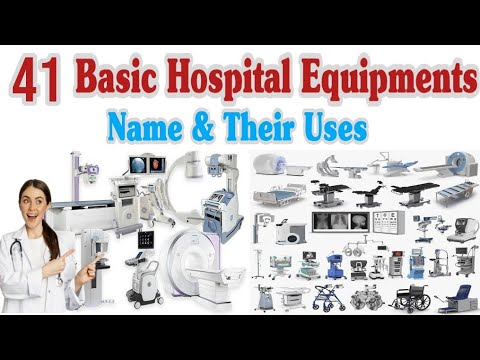What Do You Need to Be a Medical Assistant?
Contents
- What qualifications do you need to be a medical assistant?
- What are the duties of a medical assistant?
- What is the job outlook for medical assistants?
- What are the average salaries for medical assistants?
- What are the different types of medical assistant positions?
- What are the working conditions for medical assistants?
- What are the benefits of being a medical assistant?
- What are the challenges of being a medical assistant?
- What are the career advancement opportunities for medical assistants?
- What are the best things about being a medical assistant?
Considering a career in medical assisting? Here’s what you need to know about the educational requirements, job outlook, and salary potential for this rewarding profession.
Checkout this video:
What qualifications do you need to be a medical assistant?
There are a few qualifications you need to be a medical assistant First, you must have a high school diploma or equivalent. You will also need to complete an accredited medical assistant program, which typically takes one to two years. Some states also require Medical assistants to be certified, which entails passing an exam. In addition to these qualifications, it is important for Medical Assistants to have strong people skills, as they will be working closely with patients and other members of the healthcare team.
What are the duties of a medical assistant?
A medical assistant is a person who has received training to perform basic medical tasks. These tasks include taking medical histories, measuring height and weight, recording vital signs, preparing patients for examination, and giving injections. A medical assistant may also perform administrative tasks such as scheduling appointments, answering phones, and billing patients.
Medical assistants work in doctors’ offices, clinics, and hospitals. They typically work Monday through Friday during regular business hours. Some medical assistants may also be required to work evenings or weekends.
What is the job outlook for medical assistants?
The job outlook for medical assistants is good. The Bureau of Labor Statistics projects that employment for medical assistants will grow by 29 percent from 2019 to 2029, much faster than the average for all occupations. This growth is due in part to an aging population and the resulting increase in the number of medical appointments.
What are the average salaries for medical assistants?
In order to be a medical assistant, you will need to have at least a high school diploma or equivalent. Although not required, some employers may prefer that you have some prior experience in the medical field. Many medical assistants complete a postsecondary education program, which can last anywhere from several months to two years. These programs typically include both classroom and clinical instruction.
Once you have completed your education and training, you will be eligible to take the certification exam administered by the American Association of Medical Assistants (AAMA). Upon passing this exam, you will be credentialed as a Certified Medical Assistant (CMA). Some states also have their own certification exams for medical assistants.
The average salary for a medical assistant is $16.02 per hour, or $32,580 per year. Salaries will vary based on experience, education, geographic location, and employer.
What are the different types of medical assistant positions?
Medical assistants can find themselves performing a variety of roles within the medical office. Here are some of the most common types of medical assistant positions:
Clinical medical assistants perform patient care tasks such as taking vital signs, administering injections and performing electrocardiograms (EKGs). They may also assist with diagnostic testing, such as scheduling X-rays or ordering lab tests.
Administrative medical assistants handle many of the business tasks in a health care facility. This can include duties such as greeting patients, scheduling appointments, handling billing and coding insurance forms.
Specialty medical assistants have specific training in a certain area of medicine. This might include working in an optometry office, assisting with podiatry treatments or working in a laboratory.
What are the working conditions for medical assistants?
The working conditions for medical assistants vary depending on the size and location of the employer. Most medical assistants work in physicians’ offices, hospitals, or outpatient care centers. They may also work in clinics, nursing homes or other healthcare facilities.
Most medical assistants work full time, and many work evenings or weekends. Some medical assistants may have to travel to different locations to provide care.
What are the benefits of being a medical assistant?
There are many benefits to being a medical assistant. As a medical assistant, you will have the opportunity to work closely with doctors and other medical professionals. You will also be able to learn about various medical procedures and treatments. Additionally, you will be able to help patients in a variety of ways, such as scheduling appointments and providing information about their condition.
What are the challenges of being a medical assistant?
Medical assistants are an important part of the healthcare team, providing support to both doctors and patients. Being a medical assistant can be both challenging and rewarding, but it is important to be aware of the challenges before you decide to enter this field.
One of the biggest challenges of being a medical assistant is dealing with the constant demand for your time and attention. As a medical assistant, you will be responsible for tasks such as taking patients’ medical histories, checking their blood pressure, and scheduling appointments. This can be a lot of work, and it can be difficult to keep up with the constant demand.
Another challenge of being a medical assistant is dealing with sick patients. As a medical assistant, you will be in close contact with sick patients on a daily basis. This can be emotionally challenging, and you will need to have a strong stomach if you want to succeed in this field.
If you are considering becoming a medical assistant, it is important to be aware of these challenges. Medical assisting can be a demanding job, but it is also a very rewarding one. If you are up for the challenge, then this may be the career for you.
What are the career advancement opportunities for medical assistants?
Even though medical assistants have a lot of the same responsibilities regardless of where they work, there are many different types of medical assistant positions. Here are a few examples:
Clinical medical assistant: A clinical medical assistant works directly with patients. They may take vitals, collect blood and urine samples, prepare patients for exams, assist with minor procedures, provide patient education, and schedule appointments.
Administrative medical assistant: An administrative medical assistant performs office duties such as answering phones, scheduling appointments, verifying insurance benefits, coding and billing insurance claims, and handling correspondence.
Specialty medical assistant: A specialty medical assistant works in a specific area of medicine such as ophthalmology, cardiology, or orthopedics. They may be responsible for prepping patients for exams, taking vitals, collecting lab specimens, and providing patient education.
What are the best things about being a medical assistant?
There are many reasons why being a medical assistant can be a great career choice. First and foremost, medical assistants are in very high demand. The Bureau of Labor Statistics projects that employment of medical assistants will grow by 29 percent from 2019 to 2029, which is much faster than the average for all occupations. This growth is due to the increasing number of aging baby boomers who need medical care and the resulting increase in the number of medical practices and other healthcare facilities.
Another great thing about being a medical assistant is that it is a relatively low-stress job.Medical assistants typically work in well-organized and well-run facilities, and they do not have the high-pressure responsibilities of physicians or other healthcare providers. They also usually work regular business hours, although some evening or weekend work may be required in some settings.






